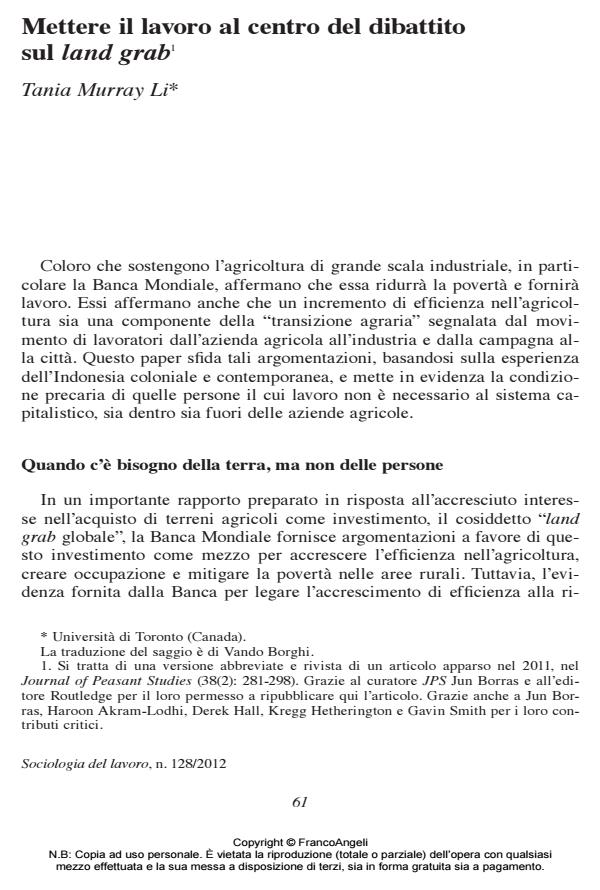Mettere il lavoro al centro del dibattito sul land grab
Titolo Rivista SOCIOLOGIA DEL LAVORO
Autori/Curatori Tania Murrai Li
Anno di pubblicazione 2012 Fascicolo 2012/128 Lingua Italiano
Numero pagine 15 P. 61-75 Dimensione file 362 KB
DOI 10.3280/SL2012-128005
Il DOI è il codice a barre della proprietà intellettuale: per saperne di più
clicca qui
Qui sotto puoi vedere in anteprima la prima pagina di questo articolo.
Se questo articolo ti interessa, lo puoi acquistare (e scaricare in formato pdf) seguendo le facili indicazioni per acquistare il download credit. Acquista Download Credits per scaricare questo Articolo in formato PDF

FrancoAngeli è membro della Publishers International Linking Association, Inc (PILA)associazione indipendente e non profit per facilitare (attraverso i servizi tecnologici implementati da CrossRef.org) l’accesso degli studiosi ai contenuti digitali nelle pubblicazioni professionali e scientifiche
I sostenitori dell’agricoltura industriale su larga scala, la Banca Mondiale in modo particolare, ritengono che essa ridurrà la povertà e fornirà occupazione. Sostengono anche che una efficienza più intensa è una componente necessaria della "transizione agraria", che si segnala atraverso il movimento dei lavoratori dall’azienda agricola all’impresa e dalla campagna alla città. Questo articolo sfida tali argomentazioni, basandosi sulla esperienza coloniale e contemporanea dell’Indonesia e pone in evidenza la condizione precaria di quelle persone il cui lavoro non è richiesto dal sistema capitalistico, sia all’interno che all’esterno dell’azienda agricola.;
Keywords:Terra, lavoro, transizione agraria, crescita senza occupazione, Indonesia, Banca Mondiale
- Introduzione. La nuova questione agraria: controllo delle risorse e riproduzione sociale Alessandra Corrado, in SOCIOLOGIA URBANA E RURALE 102/2013 pp.7
DOI: 10.3280/SUR2013-102001 - Correre per la terra Giuseppe Caridi, in ARCHIVIO DI STUDI URBANI E REGIONALI 110/2015 pp.137
DOI: 10.3280/ASUR2014-110009
Tania Murrai Li, Mettere il lavoro al centro del dibattito sul land grab in "SOCIOLOGIA DEL LAVORO " 128/2012, pp 61-75, DOI: 10.3280/SL2012-128005